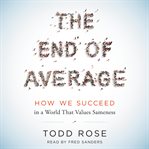The end of average How we succeed in a world that values sameness
eAudio - 2016
Are you above average? Is your child an A student? Is your employee an introvert or an extrovert? Every day we are measured against the yardstick of averages, judged according to how closely we come to it or how far we deviate from it. The assumption that metrics comparing us to an average-like GPAs, personality test results, and performance review ratings-reveal something meaningful about our potential is so ingrained in our consciousness that we don't even question it. That assumption, says Harvard's Todd Rose, is spectacularly-and scientifically-wrong. In The End of Average, Rose, a rising star in the new field of the science of the individual shows that no one is average. Not you. Not your kids. Not your employees. This isn�...39;t hollow sloganeering-it's a mathematical fact with enormous practical consequences. But while we know people learn and develop in distinctive ways, these unique patterns of behaviors are lost in our schools and businesses which have been designed around the mythical "average person." This average-size-fits-all model ignores our differences and fails at recognizing talent. It's time to change it. Weaving science, history, and his personal experiences as a high school dropout, Rose offers a powerful alternative to understanding individuals through averages: the three principles of individuality. The jaggedness principle (talent is always jagged), the context principle (traits are a myth), and the pathways principle (we all walk the road less traveled) help us understand our true uniqueness-and that of others-and how to take full advantage of individuality to gain an edge in life. Read this powerful manifesto in the ranks of Drive, Quiet, and Mindset-and you won't see averages or talent in the same way again.
- Subjects
- Published
-
[United States] :
HarperAudio
2016.
- Language
- English
- Corporate Author
- Main Author
- Corporate Author
- Other Authors
- Edition
- Unabridged
- Online Access
- Instantly available on hoopla.
Cover image - Physical Description
- 1 online resource (1 audio file (6hr., 32 min.)) : digital
- Format
- Mode of access: World Wide Web.
- ISBN
- 9780062415806
- Access
- AVAILABLE FOR USE ONLY BY IOWA CITY AND RESIDENTS OF THE CONTRACTING GOVERNMENTS OF JOHNSON COUNTY, UNIVERSITY HEIGHTS, HILLS, AND LONE TREE (IA).
Review by Kirkus Book Review

